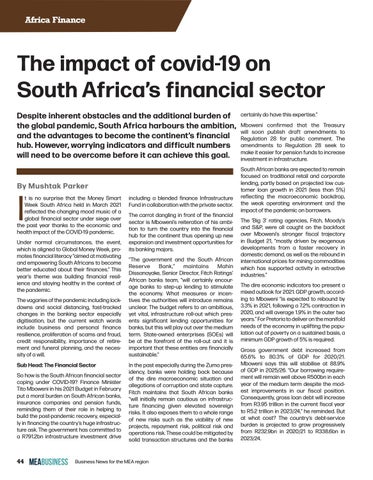Africa Finance
The impact of covid-19 on South Africa’s financial sector Despite inherent obstacles and the additional burden of the global pandemic, South Africa harbours the ambition, and the advantages to become the continent’s financial hub. However, worrying indicators and difficult numbers will need to be overcome before it can achieve this goal.
By Mushtak Parker
I
t is no surprise that the Money Smart Week South Africa held in March 2021 reflected the changing mood music of a global financial sector under siege over the past year thanks to the economic and health impact of the COVID-19 pandemic. Under normal circumstances, the event, which is aligned to Global Money Week, promotes financial literacy “aimed at motivating and empowering South Africans to become better educated about their finances.” This year’s theme was building financial resilience and staying healthy in the context of the pandemic. The vagaries of the pandemic including lockdowns and social distancing, fast-tracked changes in the banking sector especially digitisation, but the current watch words include business and personal finance resilience, proliferation of scams and fraud, credit responsibility, importance of retirement and funeral planning, and the necessity of a will. Sub Head: The Financial Sector So how is the South African financial sector coping under COVID-19? Finance Minister Tito Mboweni in his 2021 Budget in February put a moral burden on South African banks, insurance companies and pension funds, reminding them of their role in helping to build the post-pandemic recovery, especially in financing the country’s huge infrastructure ask. The government has committed to a R791.2bn infrastructure investment drive
44
MEABUSINESS
including a blended finance Infrastructure Fund in collaboration with the private sector. The carrot dangling in front of the financial sector is Mboweni’s reiteration of his ambition to turn the country into the financial hub for the continent thus opening up new expansion and investment opportunities for its banking majors. “The government and the South African Reserve Bank,” maintains Mahin Dissanayake, Senior Director, Fitch Ratings’ African banks team, “will certainly encourage banks to step-up lending to stimulate the economy. What measures or incentives the authorities will introduce remains unclear. The budget refers to an ambitious, yet vital, infrastructure roll-out which presents significant lending opportunities for banks, but this will play out over the medium term. State-owned enterprises (SOEs) will be at the forefront of the roll-out and it is important that these entities are financially sustainable.” In the past especially during the Zuma presidency, banks were holding back because of the dire macroeconomic situation and allegations of corruption and state capture. Fitch maintains that South African banks “will initially remain cautious on infrastructure financing given elevated sovereign risks. It also exposes them to a whole range of new risks such as the viability of new projects, repayment risk, political risk and operations risk. These could be mitigated by solid transaction structures and the banks
Business News for the MEA region
certainly do have this expertise.” Mboweni confirmed that the Treasury will soon publish draft amendments to Regulation 28 for public comment. The amendments to Regulation 28 seek to make it easier for pension funds to increase investment in infrastructure. South African banks are expected to remain focused on traditional retail and corporate lending, partly based on projected low customer loan growth in 2021 (less than 5%) reflecting the macroeconomic backdrop, the weak operating environment and the impact of the pandemic on borrowers. The ‘Big 3’ rating agencies, Fitch, Moody’s and S&P, were all caught on the backfoot over Mboweni’s stronger fiscal trajectory in Budget 21, “mostly driven by exogenous developments from a faster recovery in domestic demand, as well as the rebound in international prices for mining commodities which has supported activity in extractive industries.” The dire economic indicators too present a mixed outlook for 2021. GDP growth, according to Mboweni “is expected to rebound by 3.3% in 2021, following a 7.2% contraction in 2020, and will average 1.9% in the outer two years.” For Pretoria to deliver on the manifold needs of the economy in uplifting the population out of poverty on a sustained basis, a minimum GDP growth of 5% is required. Gross government debt increased from 65.6% to 80.3% of GDP for 2020/21. Mboweni says this will stabilise at 88.9% of GDP in 2025/26. “Our borrowing requirement will remain well above R500bn in each year of the medium term despite the modest improvements in our fiscal position. Consequently, gross loan debt will increase from R3.95 trillion in the current fiscal year to R5.2 trillion in 2023/24,” he reminded. But at what cost? The country’s debt-service burden is projected to grow progressively from R232.9bn in 2020/21 to R338.6bn in 2023/24.
